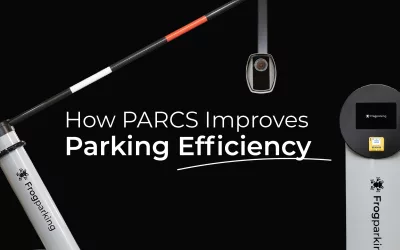As cities, universities, retailers (basically anyone in business) strive to become more sustainable, reducing the environmental impact of transportation is a key priority. The environmental benefits of smart parking systems are offering a promising solution. Similarly, it’s optimizing parking management and minimizing the negative effects of vehicle emissions and fuel consumption. Let’s explore the environmental benefits of smart parking in more detail.
Reducing Vehicle Emissions
One of the most significant environmental benefits of smart parking systems is the reduction in vehicle emissions. Traditional parking methods often involve drivers circling around looking for an open spot. Consequently, increasing idle times and fuel consumption. Smart parking systems, like a parking guidance system, provide real-time information on available parking spaces. As as result, allowing drivers to find spots quickly and efficiently. This reduction in cruise time leads to lower emissions of carbon dioxide (CO2) and other pollutants, contributing to cleaner air quality in urban areas.
Decreasing Fuel Consumption
By guiding drivers directly to available parking spaces, through parking guidance, smart parking systems help decrease overall fuel consumption. When drivers spend less time searching for parking, they use less fuel. Not exactly rocket science eh? Furthermore, leading to cost savings and a reduced environmental footprint. Additionally, smart parking systems can integrate with parking mobile apps that offer route optimization. Further enhancing fuel efficiency by providing the shortest or least congested routes to parking spaces.
Optimizing Land Use
Efficient use of land is another environmental benefit of smart parking systems. By maximizing the utilization of existing parking spaces, smart parking reduces the need for additional parking infrastructure. For example, large parking lots or multi-story garages. With unbelievable data and analytics insights possible, optimization allows customers to preserve green spaces and reduce urban sprawl. Thus, contributing to better land management and a more sustainable urban environment.
Promoting Sustainable Transportation Modes
Smart parking systems can integrate with public transportation networks. At the same time, promoting the use of sustainable transportation modes. Essentially, a mobility hub. For instance, smart parking solutions can provide real-time updates on public transit schedules and availability. As a result, encouraging drivers to park their cars and use buses, trains, or bikes for the remainder of their journey. This multi-modal approach reduces the number of cars on the road, resulting in lower emissions and a decrease in traffic congestion.
Data-Driven Urban Planning
Smart parking systems generate valuable data on parking patterns and usage trends. There is no way to deny this. Our own, Dr Tim, cannot emphasize this enough through his regular thought leadership posts on decision making. City planners can use this data to make informed decisions about urban development and transportation planning. For example, understanding peak parking times and areas with high demand can help planners design better public transportation routes or implement car-sharing programs. Ultimately leading to more sustainable urban mobility solutions.
To summarize, the environmental benefits of smart parking systems are substantial and multifaceted. Firstly, reducing vehicle emissions and fuel consumption. Secondly, optimizing land use and promoting sustainable transportation modes. In any event, smart parking contributes to a more sustainable and eco-friendlier urban environment. As the world continues to grow and face environmental challenges, smart parking solutions will play a crucial role in building greener communities.



